How to Start a Digital Marketing Agency: A Comprehensive Guide

Sorry, there were no results found for “”
Sorry, there were no results found for “”
Sorry, there were no results found for “”
Every nine-to-fiver in the digital marketing industry dreams of starting a digital marketing agency. After handling all the various aspects of digital marketing, the logical next step is to start something of your own.
But is starting a digital marketing company easy, or is it a pipe dream?
The answer may surprise you.
Learn how to start a digital marketing agency and build your business from scratch—using this guide as a starting point.
Buckle up!
Online marketing is a tough nut to crack, especially if you’re a first-time entrepreneur in the digital marketing landscape.
But that’s the thing about entrepreneurship—giving up is never in the cards, right?
And digital marketers are constantly suited up, fighting the good fight.
The proof of the pudding is in the latest Gartner survey, which claims that for:
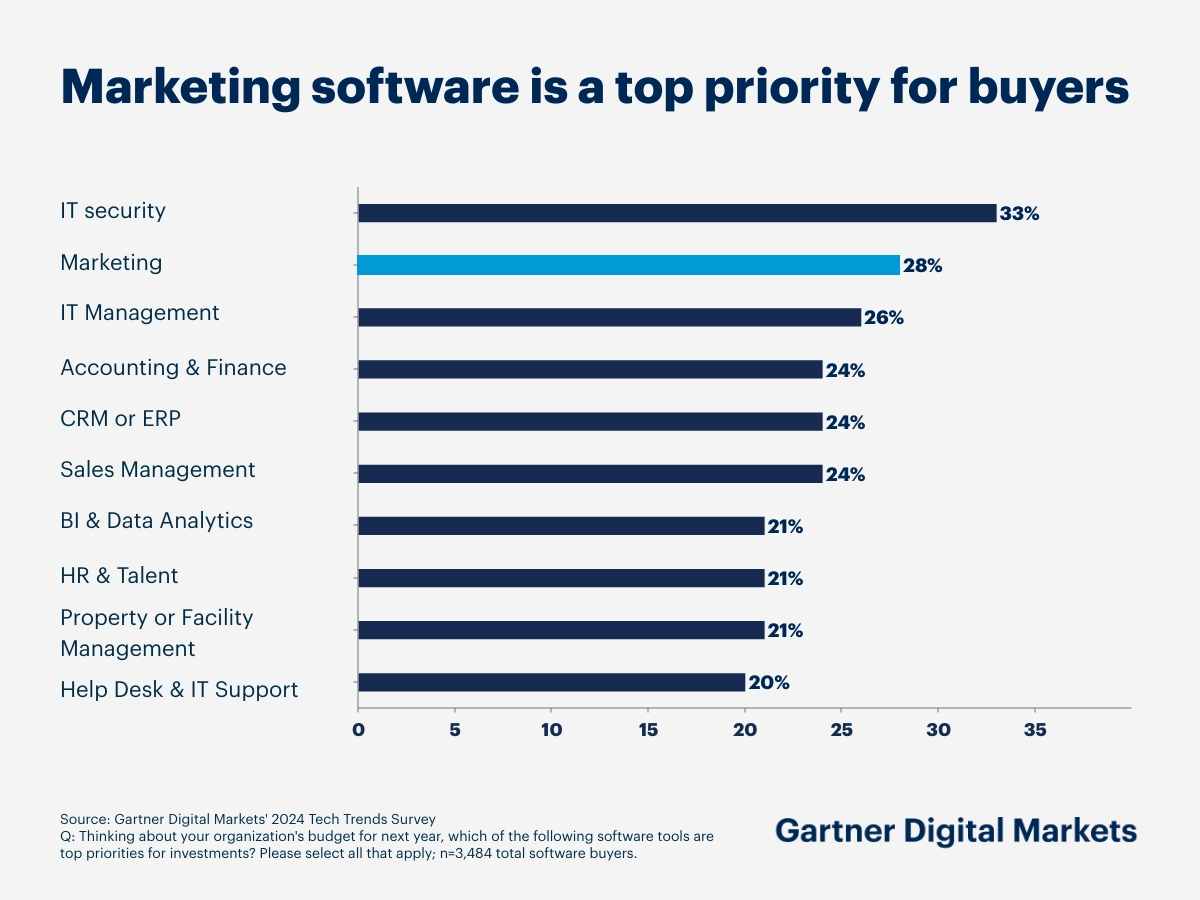
Despite the complexities, digital marketing shows no signs of slowing down. The digital ad spending is expected to reach $667.58 billion by 2024—an increase of 11% from 2023:
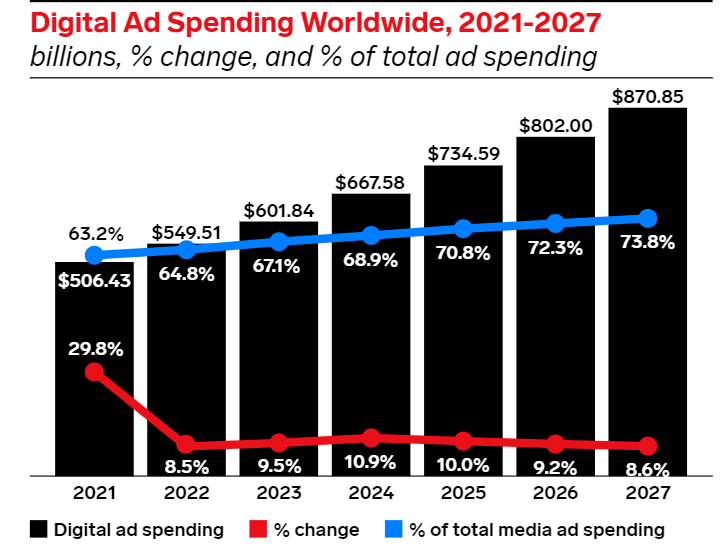
Every brand, big or small, needs to have a digital presence.
But getting a digital marketing campaign up and running is not for everyone—lack of resources, holistic digital marketing skills, and a poorly-researched business plan are to blame.
This is where a digital agency steps in.
A digital marketing agency helps you reach your target market online using:
Collectively, these services help you build a solid social media presence, generate more leads, and get more potential clients.
All you need is a well-conceived business strategy for client acquisition.
But before we get into that, let’s address the elephant in the room.
They say if you survive 100 days as an entrepreneur and your business survives the first 1000 days of its existence, then both have proved their mettle to each other.
But hanging in there and enjoying the hustle seems easier said than done.
The point we’re getting at: Is digital marketing worth it?
The short answer? Yes.

Get this: People are spending 145 minutes on social media every day. Meeting where your customers are makes business and financial sense.
The first step in evaluating the demand for your digital agency is understanding the different types of digital agency business models and which one you’d like to go for.
Common digital agency models include:
Additionally, the profitability of having your digital marketing agency also depends on the profitability analysis of the following:
Once you have a granular understanding of all these elements, you’ll be more confident to start your digital marketing journey.
The biggest advantage for self-employed digital marketing agency owners is 100% freedom to do things the way they want to—whether it’s deciding:
Even so, use these marketing strategies to set up a full-service digital advertising firm that other agencies will admire.
The decision to select a specific niche should stem from whether or not there is a demand for said niche.
Once you’ve identified a genuine demand, follow these tips to get ideas on a popular niche:
Start by looking at what your digital marketing business will focus on—will it be SEO, social media marketing, email marketing, content marketing, keyword research, Google ads, and so on? The idea is to identify your top skills and create a marketing roadmap template for teams to look at when things get chaotic (as they will in time)
Find out what’s in demand by looking for gaps where your skills fill a need. To get a better understanding, check out what your competition is doing and assess where you can stand out.
Figure out who your ideal clients are by considering factors such as the digital marketing industry, size, and location.
Think long and hard about what makes you different. Maybe it’s your approach, a unique skill, or a laser focus on a particular industry—your USP will be your brand personality.
Based on your strengths and market research, fine-tune your services to focus on what your niche audience needs most—and build your offerings around that
There’s no denying that building the right team is the bedrock of a successful agency.
Your team-building efforts must start with creating a skilled and motivated team—one that’s aligned with your agency’s goals.
Leverage these tips to create a strong and capable team from scratch:
Determine the specific roles and skills you need in your team and add them to your business plan. Consider areas such as content marketing, lead generation, web design, PPC advertising, analytics, and project management.
Create profiles based on the skills, experience, and personality traits needed for each role. Consider how each team member will fit into your agency’s culture and work environment.
Develop a recruitment strategy outlining where and how you’ll find potential candidates, including job boards, social media accounts, your website, networking events, etc.
Write clear and detailed job descriptions that outline the responsibilities, qualifications, and expectations for each role. Highlight what makes your agency a great place to work and why candidates should be excited about joining your team.
Screen resumes and portfolios to shortlist candidates who meet your criteria by:
Help new team members integrate smoothly into your agency by arming them with the necessary training, online digital marketing courses, resources, and support to set them up for success.
Encourage ongoing learning and development for your team by:
Whether you have full-time or part-time employees, you must understand the legal, training, and management aspects of handling employees. You must also drive initiatives to check for your team’s mental and emotional well-being regularly.
Setting up a robust digital marketing business means constantly worrying about getting new clients through the door while maintaining high work quality.
Why not invest in content marketing software, inbound marketing tools, or marketing agency software to accelerate output without compromising your client’s expectations?
Another tool worth looking into is the ClickUp marketing project management software, which enables digital marketing agencies to work hard without breaking into a sweat.
Here’s a quick overview of all the valuable features to help marketing teams get started:
As a marketing agency, creating a business plan for more clients is one part of the puzzle; keeping your work on schedule is another part that needs balancing skills.
ClickUp Calendar View is a great option for marketing managers looking to organize projects, plan timelines, and visualize the team’s work.
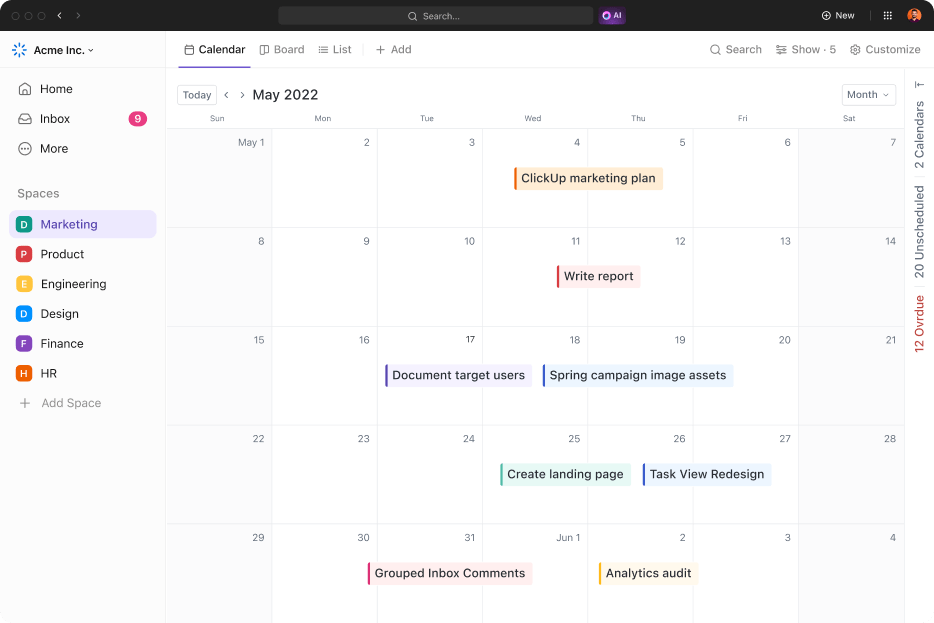
Complement your tasks with ClickUp Content Calendar Templates and plan your blogs, articles, and other content for the entire year.
A profitable business gets new clients based on the ideal target market.
But a customer-first agency allows the team to keep tabs on what’s happening at every juncture of the marketing strategy. This is where ClickUp Gantt Charts shine:
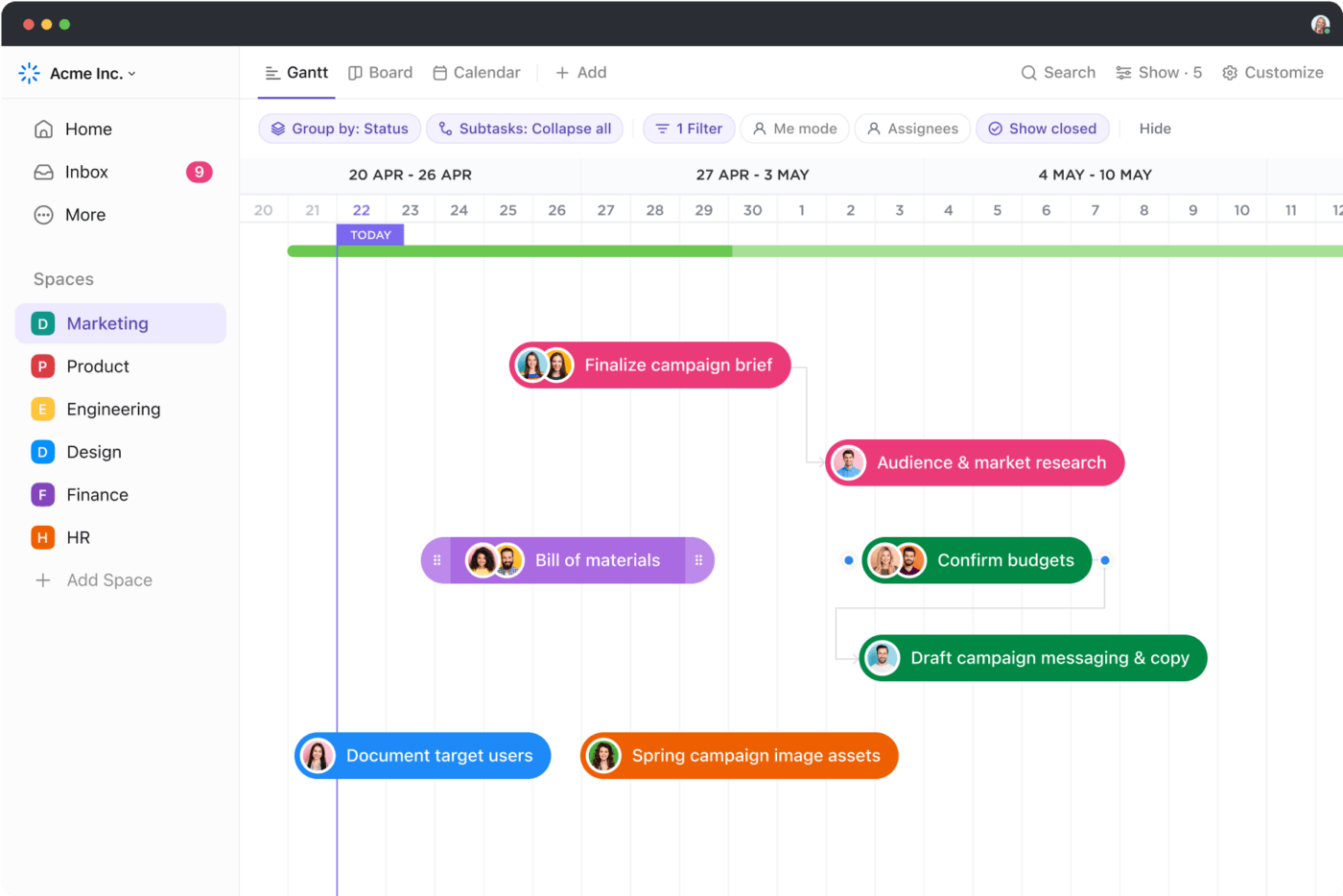
Everyone is as involved as the executive team.
Another functionality that works swimmingly well for driving profitability, productivity, and workload management across your agency is ClickUp agency resources:
Get instant access to productivity guides, ClickUp templates, and workflows, on-demand webinars from agency experts, how-to articles, and best practices at your fingertips.
Your marketing agency is only as good as your marketing goals.
Mind you, there’s more to goal-setting than zeroing in on the pricing model.
Use digital marketing apps to keep track of current digital marketing trends, consolidate tasks, streamline your digital marketing campaigns, write a case study, and more.

Using the right mix of marketing tools elevates your agency’s ability to produce results at a greater ROI.
The degree to which you stick to your business plan starts with the level of documentation your team can follow. To get things kickstarted on a speedier note and get the team on the same page, use ClickUp Docs:

Add subpages, share the Docs link, format the document as needed, and connect it to your existing workflows:
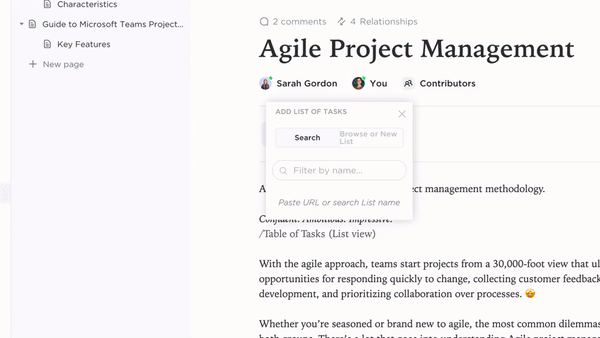
ClickUp Docs helps your team put their ideas into words and remove blind spots for your marketing campaigns.
Social media managers have to track—and exceed—the expectations of their target audience, potential clients, and the business model outlined by the agency.
With so many moving parts, creating a separate document for each becomes a cumbersome affair.
Enter: ClickUp Marketing Agency Business Template
Social media marketing agencies looking for a helping hand to build a marketing strategy must consider using custom Marketing Plan Templates.
These templates offer a roadmap for your marketing campaigns, from setting goals to selecting the right cross-channel mix.

Your digital marketing agency business should not be treated as an afterthought.
Sure, getting more clients is every agency’s North Star. However, loving what you do matters more. Your passion will translate into your marketing campaigns, and the profits will follow.
Plus, there’s the bonus of immense job satisfaction as an agency owner. To make the most of your time, investment, and work, invest in ClickUp marketing project management software.
Double down on your digital marketing needs, reach high-quality potential clients, and build a profitable business—with ClickUp as your trusted digital marketing platform.
1. How much does it cost to start a digital marketing agency?
Setting up your digital marketing business can cost anywhere between $730 to $30,000 (and upwards). This includes the costs of hiring the right talent, creating your digital marketing agency website for promotion, office space, equipment, staff salaries, and so on.
2. Can you start a digital marketing agency with no experience?
Yes, starting digital agencies without experience is possible, but it will be challenging. There’s plenty to consider, such as generating leads, driving your agency’s promotion on social media platforms, researching marketing insights and digital marketing trends, creating a business plan with a pricing model, and more.
To put yourself in a more advantageous position, think about starting as a freelancer or getting a job in the digital marketing field in any capacity. There’s no substitute for hands-on experience.
3. What types of services do digital marketing agencies offer?
The most common services digital marketing agencies offer include email marketing, content marketing, search engine optimization, paid digital advertising, web design, etc.
© 2025 ClickUp